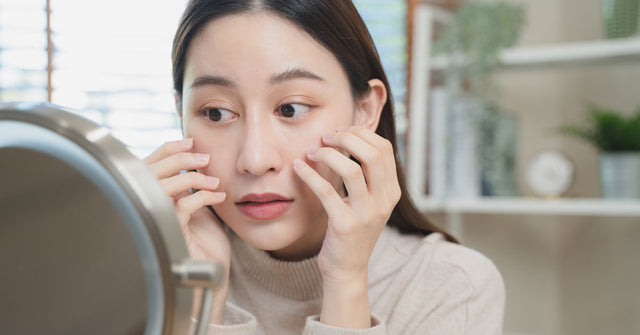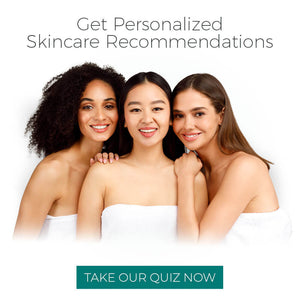This article focuses on the benefits and uses of face masks for fighting against blackheads. It shows how many times a week to use face masks, why use them, and what else to do to tackle this common skin problem.
Blackheads are a type of acne that appear as open bumps on the skin that are filled with excess dead skin cells and oil. Blackheads often appear as dots on the skin or as if dirt is trapped underneath. They’re not the same as whiteheads. The former appears as an open pore whereas the latter is in a closed pore, that’s why blackheads are called open comedones and whiteheads are referred to as closed comedones. Although blackheads can be tricky and frustrating, they can go away. Read on to learn about the benefits of using face masks for blackheads.
What Causes Blackheads?
The causes of blackheads include the overproduction of sebum (oil), which clogs hair follicles in the skin. One hair and sebaceous (oil-producing) gland is found in each hair follicle. The formation of a clog or plug in the opening of hair follicles leads to blackheads. This can happen due to a wide range of reasons [1] including:
- Hormonal changes [2] during menstruation or while taking birth control pills
- Accumulation of Propionibacterium acnes bacteria on the skin
- Certain medications (androgens, lithium, corticosteroids)
- Irritation of the hair follicles due to irregular shedding of dead skin cells
- Abnormal formation of keratin (a protein that helps form hair, nails, and skin)
What Are The Most Common Places To Get Blackheads?
The face is the most common area where blackheads develop. The reason is simple; the concentration of sebaceous glands and hair follicles is the highest on the face. Blackheads tend to form on the nose and cheeks the most, but people can also develop these types of acne on their forehead, chin, and along the hairline. Besides the facial area, blackheads may also target the chest and back.
How Common Are Blackheads?
Blackheads are very common. Nearly everyone develops blackheads at some point in life. Blackheads are most prevalent among adolescents, but 10% to 20% of adults have this type of acne too, Cleveland Clinic reports [3]. Although statistics about blackheads are scarce, numbers show [4] that acne affects up to 50 million Americans each year. That means acne is the most common skin condition in the United States. Around 85% of Americans between the ages of 12 and 24 experience at least minor acne problems. Acne isn’t reserved for teens and young adults only. This skin problem affects people of all ages, including 15% of adult women.
How Do Face Masks Help With Blackheads?
Face masks for blackheads work because they contain ingredients that address the specific needs of acne-prone skin that struggle with blackheads. These masks are not just powerful enough to eliminate impurities, but they also nourish the skin.
Face masks intended to get rid of blackheads usually contain ingredients such as salicylic acid, glycolic acid, or a combination of both. These chemicals function as exfoliators that loosen dead skin cells and sebum that clog the hair follicles.
Besides the abovementioned chemicals [5], face masks for blackheads may work through retinoids, which accelerate cell turnover. Some masks contain charcoal to treat blackheads. Charcoal absorbs dirt and impurities from the pores.
The use of face masks to fight against blackheads is also effective because powerful ingredients penetrate the skin and work directly on the problematic area.
Can a Face Mask Remove Blackheads Forever?
As face masks expose blackheads to the specific ingredients needed by the skin, the acne may dissolve faster and go away. The benefits are more visible with continued use. When masks are applied regularly, it is possible to prevent the formation of new blackheads. More precisely, face masks for blackheads can eliminate this type of acne and reduce the risk of new ones, but they don’t banish them forever.
People can still develop blackheads, but what matters is that they know how to eliminate them effectively before they become worse. With a healthy lifestyle and regular skincare routine (which includes masks), it is possible to have clear skin without blackheads and significantly lower the odds of developing them.
What are The Benefits of Face Masks?
The benefits of face masks for blackheads are numerous and one of them is visible brightness and radiance of the skin, thanks to powerful ingredients such as retinoids that exhibit brightening effects by enabling cellular turnover and collagen production. The result is a firmer, more youthful skin and even complexion.
Other benefits of masks include their ability to trap the moisture in the skin to hydrate [6]skin, which is important for people with sensitive skin. The best face mask for blackhead-sensitive skin type is the one with strong ingredients that can eliminate acne while providing calming effects to the skin.
Face masks contain gentle, natural exfoliants that remove impurities and leave a person with renewed skin. The skin gets to have a healthy glow and an even texture and looks refreshed and youthful.
How Often Should I Use A Blackhead Face Mask?
It is recommended to use a face mask at least once a week. Some people may benefit from more frequent application of face masks for blackheads.
People with sensitive skin should use a face mask at least once a week to get rid of blackheads. Other skin types can tolerate face masks up to two or three times a week.
The frequency of use of face masks [7] depends on the type of the mask. Cream or gel masks and clay and mud masks can be used up to three times a week. Charcoal masks should be used once or twice a week. Enzymatic, exfoliating, and peel-off masks should be used once a week. Sheet masks can be used daily in place of serum in a skincare routine.
Are Blackheads Contagious?
Blackheads are not contagious. They develop when hair follicles are clogged due to excessive sebum production or other factors that were mentioned above. A person with blackheads can’t spread them to someone else. At the same time, a person without blackheads won’t develop them just because they come in contact with people who have this skin problem. You can safely touch, kiss, or hug people with blackheads.
Other Strategies For Combating Blackheads
In addition to a face mask for blackheads, there are many other things a person can do for clear and smooth skin. Good practices include:
-
Regular cleansing – Regular cleansing is an integral component of a skincare regimen. Powerful cleansers such as the Rejuvoderm Clarifying Cleanser deeply cleanse the skin, remove dead skin cells, improve elasticity and firmness, and maintain moisture levels. Cleansing removes sebum, bacteria, and impurities, which results in an even-toned and blemish-free complexion.
-
Avoid touching – When people touch the skin, especially areas with blackheads, they introduce more bacteria and impurities to pores or hair follicles. This can only worsen the problem.
-
Oil-free products – Since blackheads result from excessive sebum production, it is crucial to avoid oil-based products. Focus on water-based, lightweight formulas of face masks for blackheads and other products instead.
-
Exfoliation – Exfoliation helps remove dead skin cells, excess sebum, and other impurities that would otherwise clog pores and cause blackheads.
-
Steam – Steam helps acne products work better. Steaming is usually done after cleansing to release accumulated sebum in pores, after which acne-related products or the best face masks for blackhead-sensitive skin are applied.
Lifestyle Changes for Blackhead Prevention
Although a common problem, it is entirely possible to avoid blackheads. In addition to the regular use of the best blackhead remover masks, it is helpful to make certain lifestyle changes. These include:
-
Proper skincare routine – Set up a skincare regimen to follow in the morning and before bedtime. Besides cleansers, your skincare routine should contain serums, moisturizers, and face masks. A proper skincare routine keeps sebum production in balance.
-
Diet – Eat fruits, vegetables, healthy fats, and whole grains. Consumption of Omega-3 fatty acids [8] can reduce acne as well. Sugar-laden foods or items with trans fats don’t provide nourishment to the skin, which may encourage the development of skin problems.
-
Stay hydrated – Drinking plenty of water also improves skin hydration and strengthens the immune system to fight off infections, which may prevent acne such as blackheads.
-
Stress management – Stress is strongly associated with acne [9] and its severity. Proper stress management can prevent blackheads. A skincare routine with the best face mask for blackheads sensitive skin or other skin types can also help alleviate stress because it’s a form of self-care.
-
Sun protection – Exposure to the sun stimulates the production of sebum. Make sure to use products with SPF such as Dermaxsol Sun Defense SPF30 Daily Moisturizer to protect the skin and reduce blackhead formation.
Frequently Asked Questions About Blackheads and Face Masks
Is it okay to squeeze out blackheads?
Although it may seem tempting, squeezing out blackheads is not a good idea. Squeezing blackheads with your fingers may cause trauma to the skin and contribute to problems such as scarring and hyperpigmentation. Additionally, the act of squeezing blackheads and other pimples and acne increases inflammation. While people attempt to squeeze out blackheads to get rid of them, the problem can become more severe. That happens because bacteria, oil, dirt, and other impurities from the fingers spread to the skin and may lead to even more blackheads. Applying pressure on the blackheads irritates the skin.
Are Face Masks Suitable For All Skin Types?
Face masks are generally suitable for all skin types, but it all comes down to the type of the mask or ingredients it contains. More precisely, there is a suitable face mask for every skin type and some are safe for all of them. Sheet masks tend to be gentle and work for every skin type. Peel-off and clay masks do wonders for oily, acne-prone, and combination skin types. Dry and sensitive skin tolerates masks that provide hydration.
What If I Do Not Treat Blackheads?
If you do not treat blackheads, they may become a bigger problem. When left untreated, blackheads get pushed down deeper. As a result, it becomes more challenging to remove them. Untreated blackheads increase the risk of inflammation and infection because bacteria may enter the pores. Deep blackheads enlarge pores making them susceptible to bacteria and impurities. For that reason, it is crucial to be proactive and try different methods to remove blackheads. One of the most practical ways to do that is to use the best blackhead remover mask and take care of your skin.
Do Blackheads Go Away On Their Own?
Blackheads that are close to the skin’s surface, may disappear on their own, without your intervention. However, that’s not the case with blackheads located deeper in the skin. Deeply embedded blackheads tend to be stubborn and won’t go away without intervention by a dermatologist, medical aesthetician, or powerful products such as the best face mask for blackheads sensitive skin. With a proper skincare regimen, blackheads tend to go away within six to eight weeks, depending on how big or how deep they are. Keep in mind that blackheads may still show up, especially in people prone to acne.
Conclusion
Blackheads affect millions of people. They can be quite stubborn, but not impossible to eliminate. The best blackhead remover mask works to eliminate this skin problem through multiple mechanisms. However, it is also essential to adopt healthy lifestyle habits and set up regular skincare routines for the best results.
References
1] ↑https://www.healthline.com/health/blackheads#causes
2] ↑https://www.ncbi.nlm.nih.gov/pmc/articles/PMC2585707/
3] ↑https://my.clevelandclinic.org/health/diseases/22038-blackheads#symptoms-and-causes
4] ↑https://www.aad.org/media/stats-numbers
5] ↑https://www.elle.com/beauty/makeup-skin-care/g28082804/blackhead-removal-face-mask/
6] ↑https://www.pennmedicine.org/updates/blogs/health-and-wellness/2020/march/the-magic-behind-face-masks
7] ↑https://www.healthline.com/health/beauty-skin-care/how-often-should-you-use-a-face-mask
8] ↑https://www.ncbi.nlm.nih.gov/pmc/articles/PMC7847434/
9] ↑https://pubmed.ncbi.nlm.nih.gov/17340019/
Mentioned in this article
More stories

Depression and Dark Circles: Facts and Solutions





